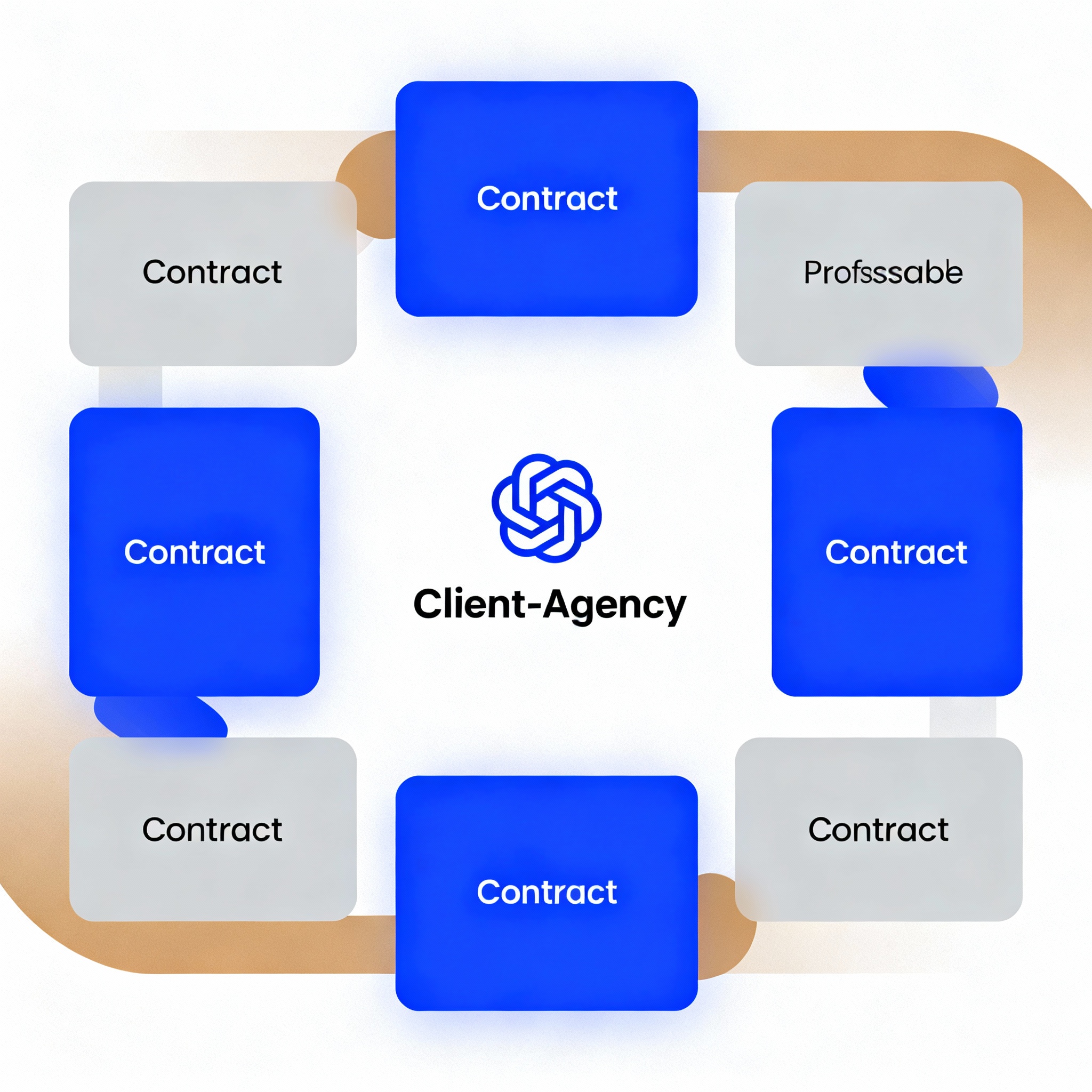Legal Checklist for Marketing Contracts 2025 — What Every Agency Needs
Picture this: it is 2 AM, you just closed a new retainer with a promising client, and you realize your template still promises a “first-page ranking guarantee.” Ouch. I once watched an agency lose a client and a month of billings because a vague scope turned into scope creep, fast. That is avoidable.
If you run an SEO company, content marketing shop, or digital marketing agency, this Legal Checklist for Marketing Contracts 2025 will help you build airtight agreements that protect revenue and reputation, and help you win more predictable work. Here’s the thing, good contracts are a sales and delivery tool, not just legal paperwork.

Why this checklist matters for SEO and digital marketing companies
- Contracts set expectations, reduce disputes, and speed collections.
- Clear deliverables help your team hit milestones and keep clients happy.
- Compliance clauses prevent costly advertising and privacy violations.
Big legal items are not optional. For example, influencer and native advertising disclosure rules are actively enforced by the Federal Trade Commission, so your contract must require legal-compliant disclosures and approvals. See the FTC’s guidance on native advertising and endorsements for specifics.
- FTC guidance on native advertising and endorsements: Native Advertising: A Guide for Businesses and FTC Endorsement Guides.
The 12-item legal checklist for marketing contracts (2024)
Use this as your pre-signing checklist when negotiating retainer and project agreements.
1) Parties and legal names
- Full legal names and entity types for both agency and client.
- Authorized signers and contact details.
Why it matters: Wrong names create ambiguity about who can enforce the contract.
2) Clear scope of work and deliverables
- Detailed services, specific deliverables, timelines, and milestones.
- What is explicitly out of scope.
- Acceptance criteria and revision limits.
Tip: Use measurable outputs, not promises of rankings or guaranteed conversions.
3) Fees, billing cadence, and reimbursement of costs
- Fixed fees, retainers, or performance pricing, with clear invoicing schedule.
- Late fees, interest, and payment dispute procedure.
- Pass-through costs for ad spend, stock assets, or third-party tools.
4) Term, renewal, and termination
- Initial term, auto-renewal terms if any, and termination for convenience.
- Termination for cause and cure periods.
- Consequences after termination: final invoices, work transfer, and data return.
5) Intellectual property and usage rights
- Who owns final deliverables, source files, and pre-existing materials.
- Work made for hire language when appropriate, plus license grants and restrictions.
- Rights to reuse creative or case study permission.
Example clause choices:
- Client owns final deliverables, agency retains rights to templates and know-how; or
- Agency assigns IP upon full payment, limited warranty of non-infringement.
6) Confidentiality and non-disclosure
- Define confidential information and exclusions.
- Duration of confidentiality obligations after termination.
- Exceptions for compelled disclosure.
7) Data protection and privacy compliance
- Who controls and who processes personal data.
- Requirement to follow applicable laws such as the GDPR for EU data subjects, and the California privacy rules (CCPA/CPRA) for California residents.
- Data Processing Agreement (DPA) or standard contractual clauses when needed.
Authoritative references:
- GDPR overview: EUR-Lex General Data Protection Regulation summary.
- California privacy resources and CPRA implementation: California Privacy Protection Agency regulations and guidance.
8) Advertising law and disclosure obligations
- Require client and agency to comply with truth-in-advertising rules.
- Mandatory approval workflow for claims, testimonials, and endorsements.
- For influencer and native content, require clear disclosure consistent with FTC guidance.
Read more: FTC Native Advertising Guide.
9) Warranties, disclaimers, and performance promises
- Narrow warranties to factual and authority matters, avoid outcome guarantees.
- Explicit disclaimer for third-party platform performance and search ranking variability.
10) Indemnities and limitation of liability
- Mutual indemnities for IP infringement and third-party claims when appropriate.
- Limit liability to a reasonable cap tied to fees paid over a specific period.
- Consider excluding consequential damages but be mindful of enforceability in your jurisdiction.
11) Dispute resolution and governing law
- Specify governing law and jurisdiction, or alternative dispute resolution such as mediation then arbitration.
- For international clients, decide on neutral venue or ICMS rules if needed.
12) Operational clauses every agency should include
- Change order process for extra work.
- Client responsibilities that affect delivery, with timelines.
- Force majeure and business continuity expectations.
- Assignment and subcontracting rules, including rights to use freelancers.
Practical checklist you can use in negotiations
- Have you listed measurable deliverables and acceptance criteria?
- Does the scope include a clear change order path?
- Are payment terms and late fees explicit?
- Is IP ownership spelled out for each deliverable type?
- Is there a DPA or reference to applicable privacy laws?
- Do you require client approvals for claims and creative prior to publication?
- Are liability caps, indemnities, and insurance requirements balanced?
Quick mini-case, real-world lesson
A mid-sized SEO agency agreed to a six-month SEO retainer with an e-commerce client. The contract promised keyword research and optimization, but the scope was silent on who would implement on the client site. The client delayed implementation for three months, then blamed the agency for slow results. The fix: a contract clause requiring client tasks be completed within agreed windows, with credits if delays exceed X days. Small detail. Big savings.
Email and marketing-specific rules to add
- For email marketing, ensure compliance with the CAN-SPAM Act, including correct identifying info and opt-out processes. See the FTC CAN-SPAM compliance guide for businesses.
Reference: CAN-SPAM Act: A Compliance Guide for Business.
Contract drafting and templates
Templates are useful for consistency, but always customize critical clauses. For practical templates and examples, explore vendor templates and legal template libraries, and then have counsel review.
Useful resources:
- Marketing services agreement templates and guides such as LegalZoom and Juro, and agency contract guides from HubSpot. Examples: LegalZoom marketing contract templates, and Juro marketing consulting agreement template.
Next steps and negotiation tips
- Ask for a 30 to 60 minute contract call before signing. Walk clients through scope, milestones, and approvals.
- Keep the contract readable. Use callouts and a short summary of deliverables on page one.
- Use change orders for every out-of-scope ask. Don’t negotiate scope via email threads.
- Consider adding an onboarding fee to cover initial setup and QA costs.
Closing thoughts for agency owners
Good contracts make selling easier and delivery smoother. They help you scale, win repeat business, and avoid surprises. If you want to turn contracts into a growth engine, start treating them like product docs: version them, track approval rates, and iterate.
If you want a quick contract audit tailored for SEO companies or digital marketing agencies, reach out. We help agencies generate more leads, convert them into retainers, and protect revenue with practical contract playbooks.

Resources and references
- FTC Endorsement guidance and native advertising rules: FTC Native Advertising Guide and FTC Endorsement Guides.
- CAN-SPAM compliance: FTC CAN-SPAM Act: A Compliance Guide for Business.
- GDPR summary and official references: EUR-Lex GDPR summary.
- California privacy rules and CPRA implementation: California Privacy Protection Agency regulations.
- Templates and practical drafting guides: LegalZoom marketing contract templates and Juro marketing consulting agreement template.
